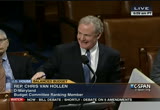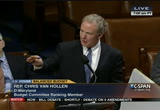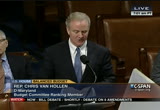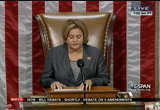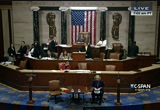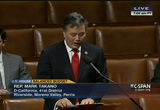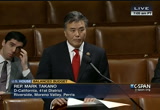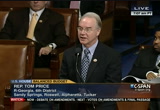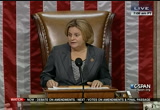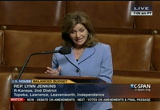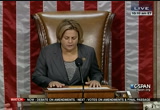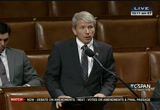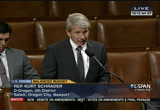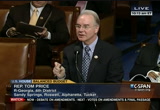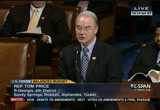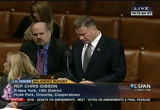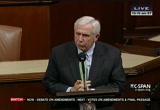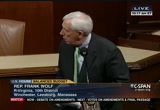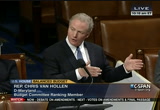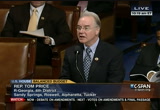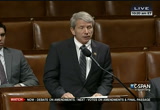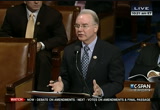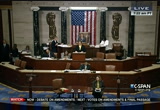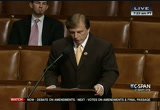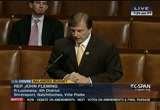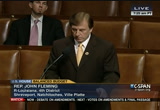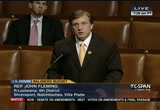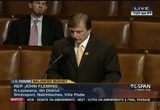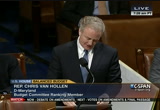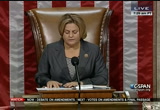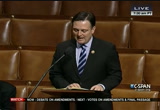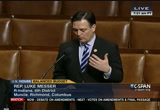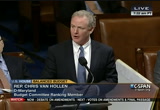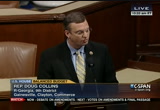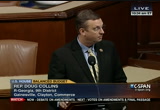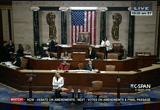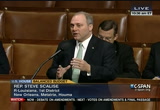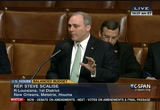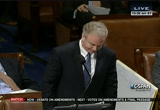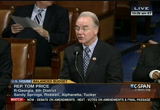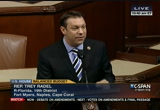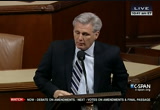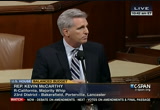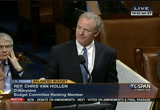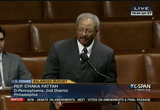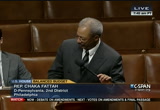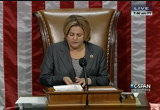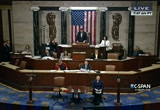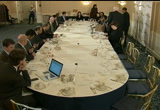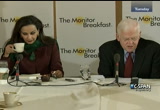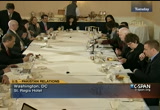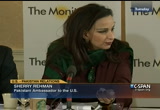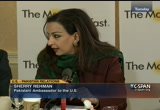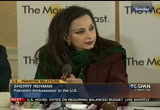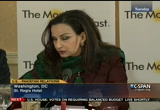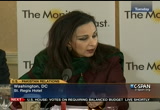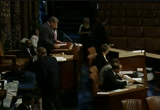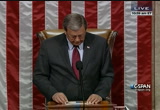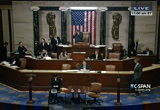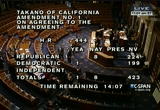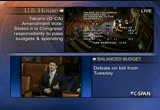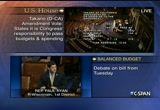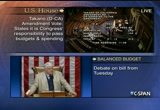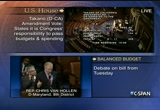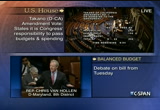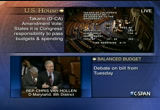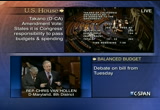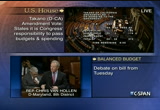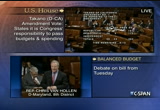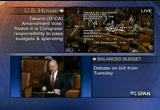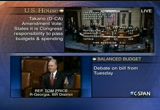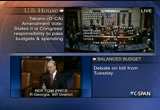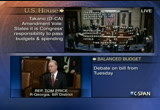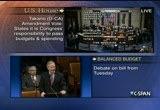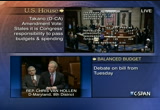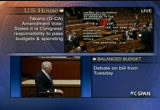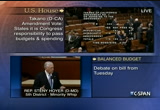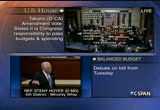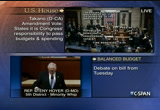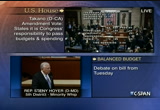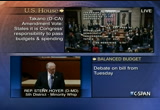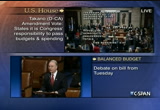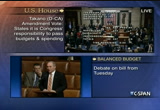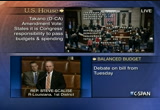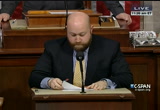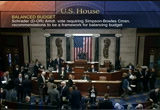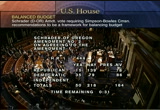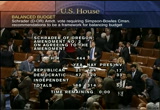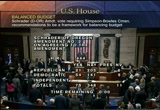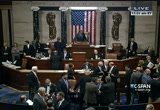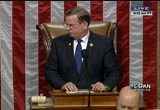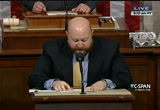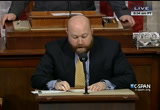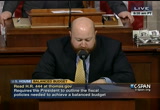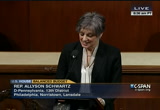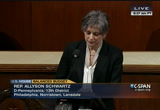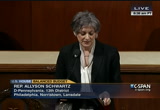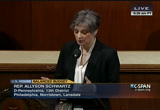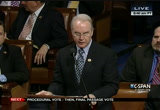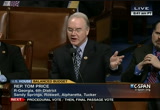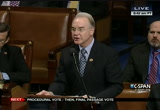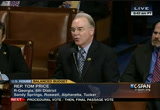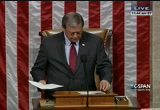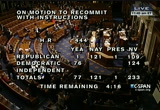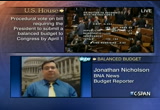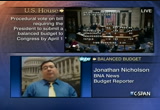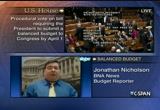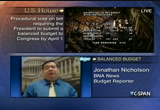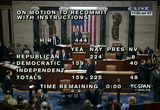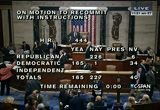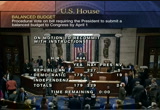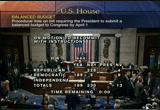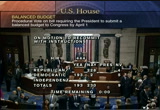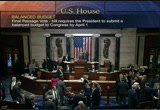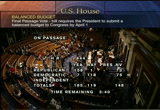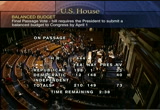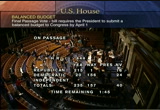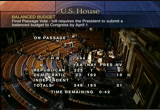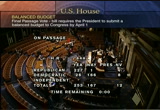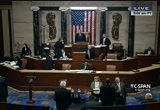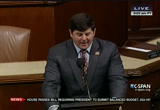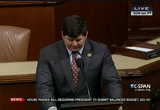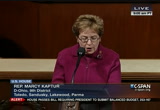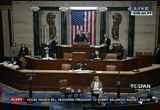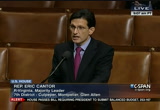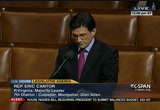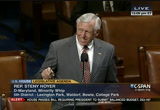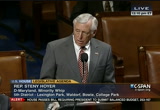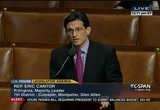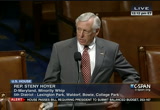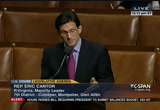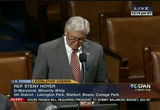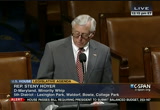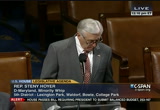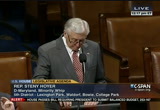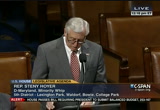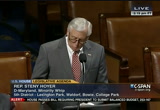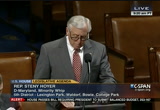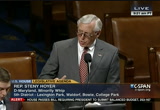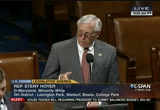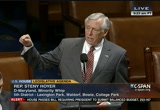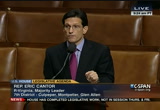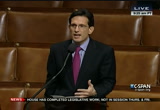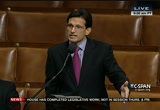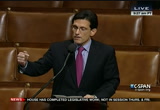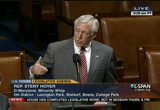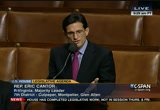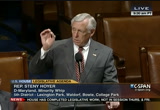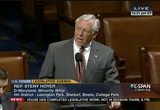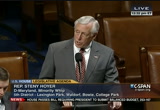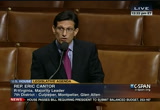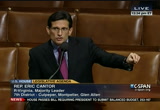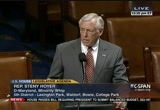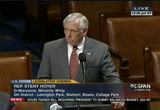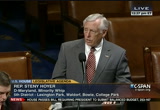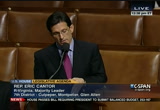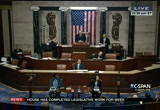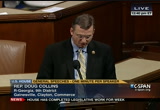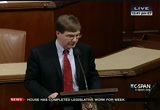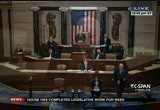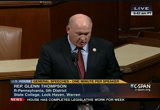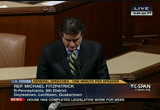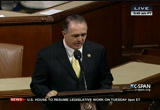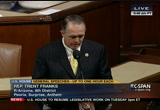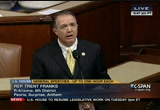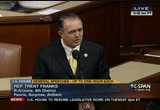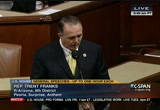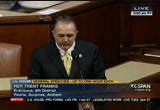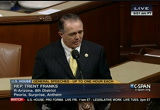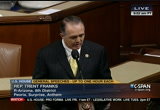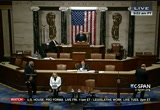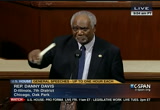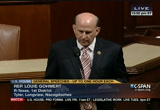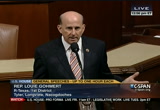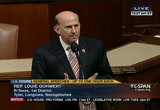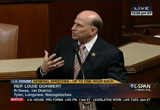tv Public Affairs CSPAN February 6, 2013 10:00am-1:00pm EST
10:00 am
budget office said, it wasn't as a result of the congressional budget office's analysis of their policies. it was simply based on assumptions that our republican colleagues provided to the c.b.o. so the real question here is, how do we reduce our deficits in a way that does not hurt the economy right now, but does make sure that as the economy improves that public spending is not -- and deficit spending is not squeeze the out by private investment. for the last couple years the problem has been opposite. we have seen less private investment, so the moneys the federal government has spent have been very important to helping the economy from going into free fall. . there is no doubt that we have to deal with the balanced approach and that's where the debate lies in how we should do that. again, our republican colleagues have said no to the balanced approach. they said no to the plan that we offered to prevent the
10:01 am
sequester. they wouldn't allow a vote on the plan we offered to prevent the sequester that's going to hit on march 1 and which our republican colleagues in statement after statement on this floor have said is going to hurt the economy and which we know from the last quarter's economic report is already hurting the economy just because businesses are anticipating the possibility these across-the board cuts. so that's the plan that we should be focused on. that's a plan that helps the economy, that will help save jobs and it's just unfortunate that we've been denied an opportunity in the people's house to even have a vote on the one plan that's been submitted in this congress, in this house to prevent those job losses and prevent the harm being done to our economy. so i would hope, madam chairman, that we put aside this political gimmick. the president will submit a budget. our republican colleagues can do with it whatever they want,
10:02 am
but let's put aside the political games and focus on jobs and the economy and let's have a vote on the plan that we have introduced to prevent that sequester from taking place and prevent the economic damage that it would do. thank you, madam chairman. the chair: the gentleman's time has expired. the gentleman from georgia is recognized for 15 seconds. mr. price: thank you, madam chair. madam chair, this is pretty simple stuff. it's what families do across this country, it is what businesses do across this country and that is to make sure they don't spend more than they take in. all this bill does is say to the president, when you bring your budget to the congress, mr. president, let us know when it balances and hopefully it's not never, as he's had the last four years. i yield back. the chair: the gentleman's time has expired. all time for general debate has expired. pursuant to the rule, the bill shall be considered as read for amendment under the five-minute rule and the bill shall be considered read. no amendment to the bill is in order except those printed in house report 112- -- 113-8.
10:03 am
each such amendment may be offered only in the order printed in the bill, may be offered only by a member designated in the report, shall be debatable equally divided by a proponent and an opponent and shall not be subject for demand for division of the question. it is now in order to consider amendment number 1 printed in how report 113-8. -- in house report 113-8. for what purpose does the gentleman from california seek recognition? mr. takano: madam chair, i have an amendment at the desk made in order under the rule. the clerk: amendment number 1 printed in how report 113-8 offered by mr. takano of california. the chair: pursuant to house resolution 48, the gentleman from california, mr. takano, and a member opposed, each will control five minutes. the chair recognizes the gentleman from california. mr. takano: thank you, madam chair. madam chair, i'd like to call
10:04 am
this the don't shift blame amendment. the bill before us today tries to blame president obama for all our fiscal woes. judging by the language of this legislation, i'm convinced that house republicans live in a world where our entire national debt suddenly appeared on january 21, 2009. but let's be clear. our debt was not created by the president alone, and while the president may be responsible for sending us a budget blueprint, it is ultimately congress that holds the power of the purse. i think my colleagues on the other side of the aisle are forgetting a key part of our job. the president does not pass budget, nor does he appropriate funds. congress does. my amendment makes a simple change to the finding section of the bill that clarifies that congress has the constitutional responsibility to fund the federal government. now, i can guarantee that when the majority introduces its budget this month it will be so
10:05 am
extreme that it has no chance of passing both houses. the republican majority seems to be able to come together for meaningless proposals, but they know that when it comes to sensible legislation, such as preventing us from going over the fiscal cliff or providing aid to sandy victims the 218th vote will come from a democrat. the only thing allowing the house republican caucus to govern is the house democratic caucus. it is the majority's failure to negotiate in good faith on the budget that has gotten us here today. year after year the house republican leadership has chosen to do anything within its power to discredit the president instead of working to solve our nation's challenges. i urge my colleagues to support my amendment and i reserve the balance of my time. the chair: the gentleman reserves the balance of his time. the gentleman from georgia is recognized. mr. price: thank you, madam chair, i claim time in opposition. the chair: the gentleman is recognized. mr. price: thank you, madam chair. i appreciate the gentleman's
10:06 am
amendment, and although possibly well-intentioned, we're not saying at all that this is just on the president's watch, that this is simply this president that is culpable. but you'd have to ignore the president's fiscal issues that he's had over the past four years to think he didn't have a hand in this. on taking office, president obama promised to cut the deficit in half. madam chair, the deficit when the president entered office was $458 billion. we all know that the deficit last year was $1.3 trillion. hardly in half. not even with new math. instead he's presided over four straight trillion-dollar-plus deficits. spending is 22% higher at the end of this president's first term. under his own budget, spending will be 40% higher at the end of his second term if congress were to go along with the proposals that he brings forward. finally, the president's on track to double, double the national debt by the end of his term in office. now, my new colleague from
10:07 am
california says that all you got to do is pass a budget through the congress and all things will be wonderful. and the house republicans have passed a budget. madam chair, it's been a budget that has put us on a path to balance, yes, and we'll do that again this year. i remind my colleague that the senate hasn't passed a budget in nearly four years which is why two weeks ago this congress, this house passed a bill, no budget no pay when we got the senate to admit they haven't passed a budget and they will do one this year. we got their attention. madam chair, while well-intentioned, trying to change the subject a little bit, this amendment doesn't, doesn't assist in getting us to the point where it is the president's responsibility to tell the american people -- in fact, it's only fair to tell the american people when it will balance. i reserve. the chair: the gentleman
10:08 am
reserves the balance of his time. the gentleman from california is recognized. mr. takano: madam chair, the house republicans have been more focused on passing budgets that message well than introducing a budget that both the house and senate can agree on. these are budgets that don't stand a chance of passing the senate simply because the g.o.p. refuses to compromise on anything. how many of their budgets end medicare as we know it? what makes them think that the senate will pass a budget that goes back on the promises we made our seniors? the budgets passed by house republicans is less valuable than the paper they are written on. they don't bring both sides of the aisle together and are a complete waste of time and the taxpayers' money. madam chair, i reserve the balance of my time. the chair: the gentleman reserves. the gentleman from georgia is recognized. mr. price: madam chair, what time remains for each side, please? the chair: the gentleman has three minutes remaining. and the gentleman from california has 2 1/2 minutes remaining. mr. price: thank you, madam chair. i'm pleased to yield a minute and a half the vice chair of our conference, ms. jenkins. the chair: the gentlelady is recognized. ms. jenkins: thank you, madam
10:09 am
speaker. i thank the gentleman from georgia for yielding. today there are still more than 12 million americans unemployed. parents are taking home lower wages to support their children and families are paying more for everything from gas to groceries. for these americans, the recession never ended. if government spending was a key to economic growth and job creation, the economy would be booming right now. but instead last week we found out things are getting worse. we all know the problem. for four years we racked up trillion-dollar deficits year after year adding another $1 trillion to the national debt. it's not a partisan issue. we all agree we need to fix it. serious problems call for serious discussions, and serious discussions require everyone to put their plan on the table. we took a solid step last week by requiring the senate to pass a budget for the first time in four years, but we must continue moving forward by requiring not just a budget but
10:10 am
a plan that actually fixes the problem. we need to pass the require a plan act so the house, senate and even the white house are all forced to step away from campaign rhetoric and short-term gimmicks, unlike the president's previous budget proposals, the plan act will require the president to finally tell the american people when and how his budget will achieve balance. it's time to get serious. americans deserve better than gimmicks and campaign rhetoric. they deserve a plan. i yield back. the chair: the gentlelady yields back the balance of her time. the gentleman from california is recognized. mr. takano: madam chair, i yield back the balance of my time. the chair: the gentleman yields back the balance of his time. the gentleman from georgia is recognized. mr. price: thank you, madam chair. i urge a rejection of this amendment and yield back the balance of my time. the chair: the question is on the amendment offered by the gentleman from california. those in favor say aye. those opposed, no. in the opinion of the chair, the noes have it. the amendment is not agreed to.
10:11 am
mr. takano: madam chair, i request a "roll call" vote. the chair: pursuant to clause 6 of rule 18, further proceedings on the amendment offered by the gentleman from california will be postponed. it is now in order to consider amendment number 2 printed in house report 113-8. for what purpose does the gentleman from oregon seek recognition? mr. schrader: amendment at the desk, madam chair. the chair: the clerk will designate the amendment. the chair: amendment number 2 printed in house report 113-8 offered by the gentleman from oregon, mr. schrader. the chair: pursuant to the rule, the gentleman from oregon, mr. schrader, and a member opposed, each will control five minutes. the chair recognizes the gentleman from oregon. mr. schrader: thank you, madam chair. i yield myself one minute. i am pleased to offer the only bipartisan amendment to this bill and maybe one of the few bipartisan amendments we'll see this congress. i hope not. this is actually an attempt to rectify some of the defisheses
10:12 am
in the underlying bill. -- deficiencies in the underlying bill. i don't agree with the findings. the lack of budget at this point in time is because of the fiscal cliff negotiations. congress frankly is to blame for that. the president usually starts his budget november, december, and that was impossible. also, i think there's little revisionist history regarding the debt that the president did inherit almost a half to 2/3 of that $1 trillion he inherited from previous administrations and previous congresses. there is a debt and deficit problem that needs addressing. the only bipartisan solution to that has been put forward by simpson-bowles. this has had widespread recognition by folks here in congress, folks outside of congress, business men and women as a possible solution to a long-term unified approach to our debt and deficit. the tenants of that of course deal with the tax expenditures that we deal with that and the health care costs that are going up. the chair: the gentleman's time has expired. mr. schrader: with that i
10:13 am
reserve the balance of my time. the chair: the gentleman from georgia is recognized. mr. price: i claim time in opposition. the chair: the gentleman is recognized. mr. price: thanks, madam chair. i want to commend my colleague from oregon and colleagues that came together to submit this amendment as i believe it truly to be well-intentioned but i think it misses the mark. i think for two reasons specifically that it ought not be adopted by this body. first, it unnecessarily restricts the ability of the president to determine how he would balance the budget. remember, the underlying bill doesn't tie the president's hands in any way. it simply says to the president, when you submit your budget to congress, just let us know when it's going to balance. it's not going to balance within the period of time that's defined by the budget window, then tell us when it's going to balance and tell us what you're going to do to make it to come into balance. the reason it's important, madam chair, it doesn't make zero equal zero on a page somewhere. it's because it's about the economy, to get the economy rolling again and get jobs being created, that's why it's important. secondly, this amendment would
10:14 am
have the president build his balanced budget around a foundation that never balances. a lot of talk about simpson-bowles and i commend them for the wonderful work that they did. however, if you get down into the details of that, there are some things in there that just simply will not work. and the biggest thing is that it never gets to balance. so the underlying bill again, madam chair, is crafted very carefully so it gives the president the greatest amount of flexibility, to propose how he believes the budget ought to be balanced. and finally, maybe the most important thing about this, the inadequacy of this amendment, is that the president has already rejected the findings in the simpson-bowles commission. the president's already rejected it. his own commission that never mind, that's not the way we want to do it. we allow the president's the greatest amount of flexibility on how he would propose to balance a budget, something that he's never done, but we want to leave him with the
10:15 am
greatest amount of flexibility so we ought to retain the underlying bill. i reserve the balance of my time. the chair: the gentleman reserves the balance of his time. the gentleman from oregon is recognized. mr. schrader: thank you, madam chair. i'd like to yield one minute to my respected colleague from new york, mr. gibson. the chair: the gentleman from new york is recognized. mr. gibson: well, thanks, madam chair. i want to thank my colleague, mr. schrader, for offering this amendment. i rise in support of it. and madam chair, we're only about three weeks away from the specter of sequestration. always meant to be a forcing function for us to come together to get a grand agreement, and what this amendment says is that the president should use the framework, the simpson-bowles framework as a starting point to get the conversation going. the president said when he initiated that fiscal commission, quote, for far too long washington has avoided the tough choices necessary to solve all fiscal problems, and they won't be solved overnight but under the leadership i'm confident that the commission i'm establishing today will have a bipartisan conis he census to put america on a path toward fiscal responsibility,
10:16 am
closed quote. we had an amendment inspired by simpson-bowles, although we modified it some. what i'm asking is that the president come forward and recognize this commission as a starting point so that once again we can come together, that we can address these unsustainable deficits. . i ask my colleagues to support it. the chair: the gentleman's time has expired. the gentleman from georgia is recognized. mr. price: i reserve the balance of our time. the chair: the gentleman reserves. the gentleman from oregon is recognized. mr. schrader: i'd like to yield one minute to the distinguished gentleman from virginia, mr. wolf. the chair: the gentleman is recognized for one minute. mr. wolf: i ask unanimous consent to revise and extend my remarks. america is broke. america is in trouble. and the simpson-bowles plan is the only framework out there that truly reforms social security and saves it for our children and grandchildren. when i go into high schools in my district and i ask students how many of you believe the social security system is sound? in the last four years not one
10:17 am
senior has raised their hand. the seniors know more than the congress. both the democrat, republican party, and more than the president. just yesterday a number of seniors receiving social security and medicare benefits will increase by 40% over the next decade. in order to he preserve social security and save it for our children, the president used simpson-bowles as a starting point. he created the commission. it received bipartisan support. then he walked away. some members on both sides are afraid of this vote. you know what you ought to be afraid of? you ought to be afraid of facing your children and grandchildren and your constituents. when this country goes bankrupt and goes into decline. i thank the gentleman for offering the amendment. i strongly urge a unanimous yes vote. the chair: the gentleman's time has expired. the gentleman from georgia. mr. price: continue to reserve. the chair: the gentleman from oregon is recognized. mr. schrader: thank you, madam speaker. i'd like to yield one minute to
10:18 am
the distinguished budget chair for democrats from maryland, mr. chris van hollen. the chair: the gentleman from maryland is recognized. mr. van hollen: thank you, madam chairman. i thank my colleague, mr. schraderer, and his colleagues for offering this amendment. i support the overall framework of simpson-bowles. i said that many times. if you look at the balance in simpson-bowles between the cuts and the revenue, it's something i think that is the model that we should be using in this body. i do want to submit for the record an analysis done by the center for budget policy priorities that shows exactly what that breakdown would be. i don't -- the chair: covered under general rule. mr. van hollen: i don't support every single recommendation within simpson-bowles. i think we have an osama bin laden obligation to come up with an alternative cut. if he we don't like the revenue, we should come up with alternative revenues. with the simpson-bowles proposal it creates a framework saying we need to take a balanced approach
10:19 am
to he reducing our deficit. i was listening to my friend, mr. price, explaining his opposition to this. he didn't want to impose requirements on the president. simply asked the president to consider these proposals. as the president himself has said, he has incorporated many of the proposals from simpson-bowles into his own budget. the ones he submitted last year and the ones he will submit this year. i support the framework. not every recommendation but the overall framework. the chair: the gentleman's time has expired. the gentleman from georgia is recognized. mr. price: thank you, madam chair. i think it's important -- again i think the intention of the amendment is sound. however, it's important to appreciate that the simpson-bowles approach fails to address the primary driver of spending, and that's health care. maybe that was why the president rejected it. i don't know. but the fact of the matter is that the simpson bowles approach
10:20 am
leaves in place the president's health care law. with its $1.7 trillion in higher spending, soon-to-be over $2 trillion, and it's trillion plus dollars higher taxes. so, i think this amendment truly is a -- again i think it ties the president's -- the president unnecessarily. i would urge its defeat and continue to reserve. the chair: the gentleman reserves. the gentleman from oregon is recognized. mr. schrader: thank u. madam chair. i appreciate the discussion here. i hope that america would note this is a bipartisan amendment. america should be pleased that republicans and democrats, some republicans, some democrats are coming together to solve our country's problems. the good chairman from georgia is unfortunately misinformed regarding simpson-bowles. it did include a great deal of discussion on health care and health care costs. the a.c.a. contrary to some misconceptions actually saved over $700 billion in taxpayer
10:21 am
money over the long haul. i think at this point in time the president whose own debt commission was simpson-bowles would be pleased to have a little direction from the ultimate appropriating budget body, which is congress, not the president. give him some direction, enable his commission to guide us with that bipartisan balanced approach, including revenues, including through tax reform, making sure that our health care and safety net is there for our kids and grandkids as the gentleman from virginia talked about. this is a very important point in this congress' deliberations. we have to come together. i urge an aye vote on this amendment. the chair: the gentleman's time has expired. the gentleman from georgia is recognized. mr. price: thank you, madam chair. i commend the gentleman once again. i would point out there is nothing in the underlying bill that precludes the president from using this as a model if that's what he so desires. but there isn't any reason why we ought to constrain the president to hopefully bring to this congress a budget that for
10:22 am
the first time in this administration actually gets to balance. that's what the underlying bill is all about. the president brings us a budget, tell us when it balances. by the way the last four budgets that you submitted have never gotten to balance. i urge defeat of the amendment. yield back the balance of my time. the chair: the amendment offered by the gentleman from oregon. so many as are in favor say aye. those opposed, no. in the opinion of the chair, the noes have it. the amendment is not agreed to. mr. schrader: madam chair, i ask for a recorded vote, please. the chair: pursuant to clause 6 of rule 18, further proceedings on the amendment offered by the gentleman from oregon will be postponed. it is now in order to consider amendment number 3 printed in house report 113-8, for what purpose does the gentleman from louisiana seek recognition? mr. fleming: madam chairman, i have an amendment at the desk. the chair: the clerk will designate the amendment. the clerk: amendment number 3, printed in house report number 113-8, offered by mr. fleming of
10:23 am
louisiana. the chair: pursuant to house resolution 48, the gentleman from louisiana, mr. fleming, and a member opposed, each will control five minutes. the chair recognizes the gentleman from louisiana. mr. fleming: thank you, madam chairman. i rise today to offer an amendment to h.r. 444, the plan act, introduced by my colleague, dr. tom price. dr. price's bill is straightforward. if the president's budget doesn't balance, tell us when it will and what policies he will use to get us there. my amendment adds a requirement if the president's supplemental budget as required by the plan act must include proposals to consolidate duplicative agency functions and programs. here's the good news, reducing duplication in government is low hanging fruit. there is bipartisan agreement on this. even the president in his state of the union address in 2011 talked about the desire to consolidate the different
10:24 am
agencies that oversee things. it's true the president does submit a document called cuts, consolidations and savings. but in last year's budgets these savings only amounted to $24 billion. a tiny percentage, 2.2%, the our annual trillion dollar shortfall. that is woefully inadequate. my amendment would require the president to go back to the drawing forward within the context of the plan act. which asks the president to tell us when his budget will balance and how he will get us there. we are now in receipt of two reports from the g.a.o. that identify opportunities to reduce duplication and overlap in government programs and we anticipate the third annual report to be released in just a few weeks. the first report identified 81 areas of duplication.
10:25 am
the executive branch and congress responded with only limited action on many of those areas. the second report identified an additional 51 areas. in addition, senator tom coburn has produced a helpful report that points out some very obvious ways we could consolidate government programs and reduce government spending. suggestions from both of these sources should be added to the president's proposals for cuts. surely we can come to some bipartisan agreement about cutting government programs. and the duplicative, obsolete, and wasteful aspects. sometimes the cause of this is special interest. businesses or industry groups that are arguing for a particular program that benefits them. or a geographic area that benefits from the program that others can't take advantage of. or a group that is adept at leveraging identity politics to
10:26 am
protect special preferences. other times congress is its own worst enemy, bickering over juries kicks and -- jurisdiction and bringing goodies back home. regardless where the problem is, we need to fix it. this is a start in the process, but unfortunately we can't actually force consolidations in this bill. i will be introducing legislation in the coming weeks to could just that, force the elimination or consolidation of duplicative agencies through a bracklike process that is fair and bipartisan. you realign and eliminate duplicative unnecessary costly excess in government act, otherwise known as the reduce government act for short, creates a six member evenly split bipartisan commission selected by the congressional leadership and the president. the commission will use resources from g.a.o. and standard program evaluation
10:27 am
tools to come up with a list of duplicative, ineffective, and wasteful programs, and a plan to consolidate or eliminate those programs. after submitting the list to the president, congress will have 45 days to pass a resolution of disapproval. after that, the consolidation goes into effect. this process mirrors the highly successful nonpolitical base realignment and closure process, otherwise known as brac, used to take plix out of the highly sensitive and politically charged military basing process. with clear transparent cry steera, a nonpartisan agenda, and streamlined process for action, the brack commission has been able to -- brac commission has been able to do what congress and the president has never been able to do before. clearly with our spending problem we need a mechanism like this to set in motion the reduction in the growth of government. in the meantime, i urge my colleagues to support my
10:28 am
amendment and allow it to be debated in the full house. while i would hope the president would do this, we can't leave it to chance. thank you. i reserve the balance of my time. the chair: for what purpose does the gentleman from maryland seek recognition? mr. van hollen: madam chairman, i ask unanimous consent to claim time in opposition even though will i not ultimately oppose. the chair: without objection. the gentleman is recognized. mr. van hollen: thank you, madam chairman. i support this amendment because this is something we all want to see happen. and which the president himself has indicated he wants to see happen. in the last fiscal year budget, in fact the president through o.m.b., office of management and budget, submitted something called cuts, consolidations and savings. to be considered by the congress and the executive branch. he also asked that legislation be submitted on his behalf to help give him more authority to organize some of these
10:29 am
government agencies which was introduced last congress by mr. barrow who may well intent to introduce that. these are things i think we all would like to see. greater efficiencies that help save money in a smart way. the president's indicated not only his intention but specific proposals to do so. we do not object. in fact i support the amendment. the chair: does the gentleman yield back? mr. van hollen: i yield back. the chair: the gentleman yields back. the gentleman is recognized for 15 remaining seconds. mr. fleming: thank you. i just want to thank the gentleman from maryland for agreeing with which is really common sense. we all i think want to squeeze out waste in government and certainly take away the duplication that's behind much of it. with that i yield back. the chair: the gentleman yields back. the question is on the amendment offered by the gentleman from louisiana. so many as are in favor say aye. those opposed, no. in the opinion of the chair, the aye vs. it. the amendment is a -- ayes have it.
10:30 am
the agreed to. it is now in order to consider amendment number 4 printed in house report 113-8. for what purpose does the gentleman from indiana seek recognition? closhed the amendment. the clerk: amendment number 4, printsed in house report number 113-8, offered by mr. messer of indiana. the chair: pursuant to house resolution 48, the gentleman from yip, mr. messer, and a member opposed, each will control five minutes. the chair now recognizes the gentleman from indiana. . mr. messer: i rise in support of the require a plan act because the american people deserve to know when or whether the budget proposed by the president would achieve balance and what policies are being pursued to require the federal government to live within its means. my amendment today is based on a very simple principle that each hardworking american taxpayer deserves to know how
10:31 am
much the deficit costs them every year. to achieve this goal the amendment will very simply the supplemental unified budget called for in the underlying bill to include the cost per taxpayer of the annual deficit for each year that budget is projected in deficit. this requirement would be a powerful reminder to the president and congress that our decisions have real world consequences for hardworking taxpayers. we've all hard the question asked, how much is $1 trillion? it's very difficult to quantify. it's very difficult to bring it into a real world context. what this bill will do is allow us to do that for taxpayers. our constituents might be surprised by what they learn. according to the internal revenue service, there were about $-- 145 million tax-paying americans last year. with $1 trillion budget deficit we had in recent years, that would calculate out to about
10:32 am
$6,896 per year per taxpayer to cover our existing deficit. the total tab for the past four years of $1 trillion each year would be about $27,500 a year. back in the sixth district of indiana where i come from, that is a lot of money. i think we it owe it to the taxpayers know what we're doing here in washington. i yield -- i reserve the balance of my time. the chair: the gentleman reserves the balance of his time. for what purpose does the gentleman from maryland seek recognition? mr. van hollen: thank you, madam chairman. i ask unanimous consent to claim time in opposition even though i am not. the chair: the gentleman is recognized. mr. van hollen: thank you, madam chairman. i think it's very useful to let everybody in the country know exactly what the debt and deficit will be on a per capita basis. we in congress can of course do the math. i think it's no problem asking the president to run that calculation as well.
10:33 am
again, i want to emphasize the fact there is agreement on reducing the deficit. the real differences here are over how we do it, but regardless how you want to do it, i think the gentleman's offered a useful amendment. more information for the american people the better, and we will not object and in fact support the amendment. the chair: the gentleman reserves the balance of his time. the gentleman from indiana is recognized. mr. messer: thank you. i yield one minute to my good friend and classmate, the gentleman from georgia. the chair: the gentleman is recognized. >> thank you, madam speaker. i rise in support of this amendment because in the 60 seconds before i speak before this body the government will spend $7 million. madam speaker, in the 60 seconds before i speak before this body, the federal government will borrow $3 million. mr. collins: madam speaker, i rise in support of this amendment because in washington
10:34 am
-- the economy is paying the price. these discussions over fiscal cuts and priorities can be difficult. telling the president that he's failed to lead can make my colleagues on the other side of the aisle uncomfortable, but we can't let the emotion of the moment override the honesty of the moment. sustainable debt is a myth. the number of people in federal programs has grown faster than the u.s. population and continuing to grow our federal debt is like driving with the emergency brake on. it will not get us where we want to go and do significant damage in the process. the more government borrows, the more the u.s. pays. we paid $220 billion on the interest on the debt. and this number will continue to grow unless serious reforms are made. this is a serious amendment that our constituents deserves to see pass. this amendment -- the chair: the gentleman's time has expired. mr. messer: we'll yield him 10 more seconds. the chair: the gentleman is recognized for 10 seconds.
10:35 am
mr. collins: thank you, madam speaker. the same reality the american taxpayers face every day, you cannot spend more than you earn. i thank the gentlemen for their leadership and i yield back. the chair: the gentleman yields back. does the gentleman from maryland seek recognition? mr. van hollen: i yield back the balance of my time. the chair: the gentleman from indiana is recognized. mr. messer: i want to thank my colleague for your support of the amendment. i ask support support. the chair: the question is on the amendment offered by the gentleman from indiana. those in favor say aye. those opposed, no. in the opinion of the chair, the ayes have it. the amendment is agreed to. it is now in order to consider amendment number 5 printed in house report 113-8. for what purpose does the gentleman from louisiana seek recognition? mr. scalise: madam chair, amendment at the desk. the chair: the clerk will redesignate the amendment.
10:36 am
the clerk: amendment number 5 printed in house report 113-8 offered by mr. scalise of louisiana. the chair: pursuant to house resolution 48, the gentleman from louisiana, mr. scalise, and a member opposed, each will control five minutes. the chair recognizes the gentleman from louisiana. mr. scalise: thank you, madam chair. the amendment that i bring forward just puts some additional transparency into a piece of legislation that i strongly support that just requires the president to lay out a detailed plan of how his budget would plan. what this amendment would do would be to specifically carve out direct spending. direct spending, madam chair, represents more than 60% of all federal expenditures, so more than 60% of our spending is means tested and nonmeans tested and all we ask for with this amendment is the transparency as that supplemental budget is produced that it also breaks out how means tested spending and nonmeans tested spending number one was averaged over the prior
10:37 am
10 years but also in this supplemental budget the president would lay out what would happen to those direct spending programs over the course of the period that the president would lay out in that supplemental budget. and one other thing it does is it makes sure if there are any reforms -- just like in the house budget, if we lay out in the reforms, those would have to be spelled out in the language of this amendment. if any reforms to direct spending would be included in the presidential -- president's supplemental budget that those reforms would have to be spelled out in an actual text of that document. so this is something we already included in the house rules package, so it's part of the house rules. when a house budget is presented. so we felt like the american people deserve this kind of transparency, especially when you're talking more than 60% of the budget, let's make sure it's laid out. i reserve the balance of my time. the chair: the gentleman reserves the balance of his time. the gentleman from maryland is recognized. mr. van hollen: thank you,
10:38 am
madam chairman. i ask unanimous consent to claim time in opposition even though we will not oppose it. the chair: the gentleman is recognized. mr. van hollen: thank you, madam chairman. again, what this amendment does is ask the president when he submits the budget is provide information about mandatory spending and means tested spending. in fact, the president already does this in his budget. i have in my hand the budget for fiscal year 2013. that's the current fiscal year that we're in now. historical tables that were submitted by the president as part of that budget submission, categories include mandatory spending. within mandatory spending they break it down. social security, deposit insurance, means tested, means tested entitlements and others. this is information that the president already provides as part of the budget process. i am happy to support him continuing to do this. thank you, madam chair. the chair: the gentleman reserves the balance of his time. the gentleman from louisiana. mr. scalise: i yield one minute to the gentleman from georgia, the author of the underlying bill, mr. price.
10:39 am
the chair: the gentleman from georgia is recognized. mr. price: thank you, madam chair. i want to thank the gentleman for bringing forth this amendment and supporting the underlying bill. the amendment, as the gentleman from maryland said, simply provides greater information, more transparency, more information from the president on his budget on the differences between the mandatory and the means tested and the discretionary side of the budget. it also i think is so important for the american people to gain as much information as possible as we move through this national debate. the national debate of whether or not it is appropriate for the president to bring a budget to congress that in the past four years has never balanced. the underlying bill again urges the president to bring a bill, a budget to the congress that gets to balance and let's the american people know when it does. i want to commend my colleague from louisiana for his amendment and urge adoption of the amendment and the underlying bill. the chair: the gentleman from louisiana is recognized.
10:40 am
mr. scalise: can i inquire how much time remains? the chair: the gentleman from louisiana has 2 1/2 minutes remaining. and the gentleman from maryland has 4 1/4. mr. scalise: at this time if i could yield one minute to the gentleman from florida, mr. radel. the chair: the gentleman from florida is recognized. mr. radel: thank you, i'd like to thank the gentleman from louisiana for his hard work. i'd like to take a moment to speak in support of the scalise amendment. in doing so is a much bigger picture that isn't being talked about when it comes to the challenges that our country faces today. our problems go beyond republican, beyond democrat. our problems are numbers. debt and deficits that we cannot begin to wrap our arms around. and so what we must do as a country and beyond party lines is work together as americans. today i ask for your support of this amendment to demand accountability and transparency from washington. accountability when it comes to your money. not taxpayers, not stimulus
10:41 am
dollars. your money. now we often hear from the president that we cannot cut shes cut, cut and i agree. this is not about cutting. this is about saving. this is about saving social security, saving medicare, saving our economy and ultimately our government. in a big picture we must demand that us as elected officials and servants of the people are held accountable. both the scalise require and -- scalise amendment and require a plan act does that. thank you. the chair: the gentleman from maryland continues to reserve. the gentleman from louisiana is recognized. mr. scalise: at this time i'd like to yield a minute and a half to the house whip, republican whip from california, mr. mccarthy. the chair: the gentleman from california is recognized. mr. mccarthy: thank you, madam chair. i thank the gentleman for yielding. i rise in support of the amendment. this amendment will bring transparency, accountability back to the budget process. something that has been sorely lacking under this president.
10:42 am
let's just look at the facts. the last budgets from president that were voted on has not received one vote in support from the house or the senate. that's on the democrat side nor the republican side. every year this president's been in office, the deficit is added by $6 trillion. out of the last five budgets, four of them have been late. the president has never submitted a budget to this house or to the other that balances. that is a record of failure. that is distressing to this house and to the american people. we deserve better. it's unfortunate this house has to pass bills to get responsible budgeting. that's why i support this amendment and the underlying bill and i yield back. the chair: the gentleman yields back. the gentleman from maryland continues to reserve. the gentleman from louisiana is recognized. mr. scalise: madam chair, i'm
10:43 am
prepared to close. the chair: the gentleman will -- mr. scalise: i'll reserve. the chair: the gentleman from maryland is recognized. mr. van hollen: thank you, madam chairman. i will not use the time. as i said, what this amendment requests is information that in fact the president already provides as part of the budget submission. i indicated i have in my hand the information from last fiscal year's budget. i do think in point and in pursuit of transparency it's important to point out when the president was first sworn in his first term, before he put his hand on the bible, he faced a projected deficit of well over $1 trillion, a record deficit at that time. as we saw from the congressional budget office in their report just the other day, that deficit is now coming down as the economy's improved and as the president's policies have begun to take shape, that deficit is on its way down. is it far enough down? no. there's a legitimate debate as to the best way to get there.
10:44 am
as part of that debate, certainly the more information the better, and as i indicated, this information that's being requested is in fact already provided to the congress. so we will not oppose it. in fact, i'll support the amendment. thank you, madam chair. the chair: is the gentleman reserving or yielding back? mr. van hollen: if i could yield a minute to the distinguished gentleman from pennsylvania, mr. fatah. the chair: the gentleman from pennsylvania is recognized for one minute. mr. fattah: i rise in support of this amendment, as our ranking member said, this information is already provided. i also rise in support of the simpson-bowles proposal. i voted for it on the floor of the house. i am only one of three dozen who supports it. but hopefully many more will support it. we need to get our fiscal house in order. the majority party has had this selective apple nearbyia,
10:45 am
however. we were -- amnesia, however. we had $1 trillion deficit for that fiscal year the day he was sworn in. your party seems to run away from any responsibility to this. then you pass a budget the last couple of years that doesn't balance until 40 years from now and now this rush to the floor that we must have balance, we must have transparency, but that's ok. whatever brings you to the party. it's like in my church, you come and you find a belief and shared belief that a fellowship of faith have, that's great. so if you're joining this party that we want to get our fiscal house in order and that deficits do better and that the debt matters, then we welcome that. if this is a political charade, you should be concerned about your credibility. thank you. the chair: the gentleman's time has expired. the gentleman from louisiana. . mr. scalise: we don't have the numbers from the president because he missed the statutory
10:46 am
deadline. we are hoping he at least puts forth a budget. it would be ideal if he puts forth a budget that shows balance in some period of time like we have done, but at the same time we also expect transparency so that the american taxpayers can see we are more than 6 -- where more than 60% of the budget is spent. i urge adoption of this amendment and the underlying bill. i yield back the balance of my time. the chair: the gentleman yields back the balance of his time. the gentleman from maryland. yields back the balance of his time. the question is on the amendment offered by the gentleman from louisiana. so many as are in favor say aye. those opposed, no. in the opinion of the chair, the ayes have it. the amendment is agreed to. for what purpose does the gentleman from georgia seek recognition? mr. price: thank, madam chair, i move the committee do now rise. the chair: the question is on the motion that the committee rise. so many as are in favor say aye. those opposed, no. the ayes have it. the motion is adopted. accordingly, the house stands adjourned until -- accordingly,
10:47 am
the committee rises. the chair: mr. speaker, the committee of the whole house on the state of the union having had under consideration h.r. 444, directs me to report that it has come to no resolution thereon. the speaker pro tempore: the chair of the committee of the whole house on the state of the union reports that the committee has had under consideration h.r. 444, and it came to no resolution thereon. 12-a of rule 1, the chair declares the house in recess for a period of less than 15 minutes.
10:50 am
>> this is her first visit with our group and we are very grateful she agreed to be here. especially since the last ambassador who visited us lost his job the next day. you're a woman in danger. our guest is the daughter of a prominent parents and a phi beta kappa graduate of smith college where she studied government and art history. she spent 20 years as a journalist in both print and broadcasting, and rose to became editor of "the herald" news magazine. in the political world she was first elected to parliament in 2002. to assume her current post here
10:51 am
in washington, she stepped down as ranking member of the national security committee in back stand's parliament and as chairperson of pakistan's red crescent society. so much for biography. now on to exciting matters of process. as always we are on the record. please no live blue dogging or tweeting. in short in filing of any kind while the breakfast is under way. there is no embargo when the breakfast is over except that c-span has agreed not to use video of the session for at least two hours after the breakfast ends to give everyone here time to file if they wish. finally, if you'd like to ask a question, please do the traditional thing and send me a subtle nonthreatening signal and i'll call on one and all happily. now we'll begin by offering the ambassador the opportunity to make opening comments and then we'll move to questions from around the table. thanks again for coming. >> thank you so much all of you. thank you particularly to "the monitor" for hosting this. it's actually a long overdue exercise and i'm very happy to
10:52 am
be here this morning and to be given a what i call a unique opportunity to address issues that we had been looking at and i know some of you in the media have been following. over the last many years. yes, i think i have very good reason to be in danger, but i hope that we come out of this not enslaved, shall we say. my biowas interesting, but i have -- bio was interesting, but i have spent over a year in being spokesperson for the pakistan people's party as well as for the government as minister and i resigned as that a while ago. so it's not difficult for me to be boring and not give you something that is an excellent sound bite. really my attempt is is to just give you a very quick i'm told
10:53 am
three-minute rundown of what -- where we are in the pakistan-u.s. relationship. i assume that's of interest to everyone here, but i'm happy to take questions on other issues and speak to as many of the concerns you might raise. it is good to be able to say that after a year, nearly -- over a year of my being here in washington, since november, 2012, this relationship has come a long way from the days of 2011 and early 2012, when it was marked by chronic distress, and crisis management and episodes that left many of us awake at night. i'm happy to report that the relationship is now on a stable and we hope uphill trajectory. our expectations are clearly
10:54 am
articulated to each other. and certainly the goals that we have mutually of stabilizing the region and working together for peace and stability in south and central asia as well as in pakistan are a task that is dauntingly cut out for us. we also, of course, i also want to report that quite apart from the relationship, pakistan is undergoing historic transformation and transition in the sense that we are in a few months about to go to our first peaceful constitutional transfer of power which is through the conduct of a general election. this is the first elected government to have finished its five years, and we look forward to engaging with the united states as a new democracy, which
10:55 am
we have been for the last many years, but as i round this up, i'm also looking forward to discussing many, many issues, but also to tell you that we are now in the middle of a sustained chronology of institutional working groups that address different issues of interest to both countries. namely on our strategic issues from the economy to finance, from energy, defense, law enforcement, counterterrorism, and of course strategic stability. our principles have also been -- principals have also been meeting. we had a meeting in brussels as you may is have heard. we have also been meeting off and on and facilitating working groups as well as high level bilateral engagements. codeas from congress have been
10:56 am
going and we have had several visitors from pakistan so we are looking forward to a relationship that is defined by confidence, trust, mutual respect, and investment in each other's societies and nations not just states. to grow together in the 21st century as long-standing friends and allies. i look forward to working with all of you as friends and -- i have been a journalist for too many years, so you can't take that out of the girl. you can certainly take me out of journalism but it's difficult to do that. and i am also -- i want to also add very quickly that whale we are making this historic transition, back stand is looking towards -- profiling itself and visiting on regional peace and transformations in the
10:57 am
region. we have made an important foreign policy shift both in terms of process and engagement in the region. when i say process i say that it is grounded for the first time in our history in the bedrock of parliamentry consent, public legitimacy, and many stakeholders that matter being onboard in the manging of foreign policy. so this is a first for pakistan, including our relationship with the united states, which is now pretty much run by parliamentry guidelines, and we move affording to those now, which does empower us to take decisions that are sustainable, we hope. and we look for a relationship that is long lasting and not just a function of our relationship with the united states and pakistan as it transitions after the region.
10:58 am
>> thank you for that. did they offer you breakfast? >> yes, they did. >> so busy taking notes. let me ask you one or two and move to my colleagues. you were early in offering congratulations to john kerry. i wanted to ask you about the impact if any you see kerry moving in as secretary of state is going to have. as you know the "wall street journal" ran an oped piece last week talking about how at least the view in india is that kerry stilts towards pakistan. what's your sense of the importance of any -- >> we'll break away here as the u.s. house is back for votes on the balanced budget bill. the chair: the house is in the committee of the whole house on the state of the union for further consideration of h.r. 444 which the clerk will report by title. the clerk: a bill to require
10:59 am
that if the president's fiscal year 2014 budget does not achieve balance in a fiscal year covered by such budget, the president shall submit a supplemental unified budget by april 1, 2013, which identifies a fiscal year in which balance is achieved, and for other purposes. the chair: when the committee of the whole rose on wednesday, february 6, 2013, the amendment offered by the gentleman from louisiana, mr. scalise, had been disposed of. pursuant to clause 6 of rule 18, proceedings will now resume on those amendments printed in house report 113-8, on which further proceedings were postponed in the following order -- amendment number 1, mr. takano of california, amendment number 2, mr. schrader of louisiana. the chair will reduce to two minutes the time of any electronic vote after the first vote in this series.
11:00 am
the unfinished business is a request for a recorded vote on amendment number 1 printed in house report 113-8, by the gentleman from california, mr. takano, on which further proceedings were postponed and on which the nays prevailed by voice vote. the clerk will redesignate the amendment. the clerk: amendment number 1 printed in house report 113-8 offered by mr. takano of california. the chair: a recorded vote has been requested. those in support of the request for a recorded vote will rise and be counted. a sufficient number having arisen, a recorded vote is ordered. members will record their votes by electronic device. this will be a 15-minute vote. [captioning made possible by the national captioning institute, inc., in cooperation with the united states house of representatives. any use of the closed-captioned coverage of the house proceedings for political or commercial purposes is expressly prohibited by the u.s. house of representatives.]
11:26 am
the chair: on this vote the yeas are 194, the nays are 228. the amendment is not adopted. the unfinished business is the request for a recorded vote on amendment number 2 printed in the house report 113-8 by the gentleman from oregon, mr. schrader, on which the further proceedings were postponed and on which the anyways prevailed by voice -- nays prevailed by voice vote. the clerk will redesignate the amendment. the clerk: amendment number 2 printed in house report 113-8 offered by mr. shader -- schrader of oregon. the speaker pro tempore: a -- the chair: a recorded vote has
11:27 am
been requested. those in support of the request for a recorded vote will rise and be counted. a sufficient number having arisen, a recorded vote is ordered. members will record their votes by electronic device. this will be a two-minute vote. [captioning made possible by the national captioning institute, inc., in cooperation with the united states house of representatives. any use of the closed-captioned coverage of the house proceedings for political or commercial purposes is expressly prohibited by the u.s. house of representatives.]
11:31 am
11:32 am
the speaker pro tempore: mr. chairman. the chair: mr. speaker, the committee of the whole house on the state of the union has had under consideration h.r. 444 and pursuant to house resolution 48 i report the bill back to the house with sundry amendments adopted in the committee of the whole. the speaker pro tempore: the chair of the committee of the whole house on the state of the union reports that the committee has had under consideration the bill h.r. 444 and pursuant to house resolution 48 reports the bill back to the house with sundry amendments adopted by the committee of the whole. under the rule, the previous question is ordered.
11:33 am
is there a separate vote demanded on any amendment adopted in the committee of the whole? if not the question is on adoption of the amendments. those in favor say aye. those opposed, no. the ayes have it and the amendments are adopted. the question is on engrossment and third reading of the bill. those in favor say aye. those opposed, no. the ayes have it. third reading. the clerk: a bill to require that, if the president's fiscal year 2014 budget does not achofe balance in a fiscal year covered by such budget, the president shl submit a supplemental unified budget by april 1, 2013, which identity fights a fiscal year in which -- achieve balance in a fiscal year covered by such budget, the president shall submit a supplemental unified budget by april 1, 2013, which identifies a fiscal year in which balance is achieved, and for other purposes. the speaker pro tempore: can we have order in the house?
11:34 am
members will take their conversations off the floor. members will take their conversations off the floor. i have a motion to recommit at the desk. the speaker pro tempore: for what purpose does the gentlewoman from pennsylvania seek recognition? ms. schwartz: i have a motion to recommit. i am opposed. the speaker pro tempore: the clerk will report the motion. the clerk: ms. schwartz of pennsylvania moves to recommit the bill h.r. 444 to the committee on the budget with instructions to the report the same back to the house
11:35 am
forthwith with the following amendment -- strike section 2-b and insert the following -- findings. congress finds the following. one, since 2009 every bipartisan commission including the one appointed by the president has recommended and the majority of americans agree that we should take a balanced bipartisan approach to reducing the deficit that addresses both revenue and spending. two, squegs ration, established by the budget control act of 2011 that was passed by the congress and signed by the president it is a meat ax approach to deficit reduction that imposes deep and mindless cuts regardless of their impacts on vital services and investments. three, congress should immediately pass legislation that the president could sign that replaces the sequester with a balanced approach that would increase revenues without increasing the tax burden on middle-income americans. and decrease long-term spending while maintaining the medicare guarantee, protecting social security and a strong social
11:36 am
safety net and making strategic investments in education, science, research and critical infrastructure necessary to compete in the global economy. the speaker pro tempore: the house will be in order. the house will be in order. the gentlewoman from pennsylvania is recognized for five minutes. ms. schwartz: thank you. i rise in opposition to this bill and to offer the final amendment that will not kill the bill or send it back to committee. if adopted, the bill, as amended, will immediately proceed to final passage. this amendment rejects the rigid partisan view presented in this legislation that deficit reduction must be achieved by spending cuts alone regardless of the consequences. moving from one crisis to
11:37 am
another and failing to meet our responsibilities as republicans have done time and time again has hurt our economic growth. most recently in december, our economy contracted for the first time in three years. as a result of delayed action by republican leadership in the house. this amendment makes clear there is a better way. it recognizes that our nation faces serious financial challenges. we agree, as the president does, that these fiscal challenges must be addressed. we believe that we must reduce the deficit over time, and we must work to stabilize the debt, but we must do so in a way that does not hurt our economic recovery, that enables us to meet our obligations to our seniors and to our children and to our future and ensures that our economic competitiveness and economic growth. every bipartisan commission -- >> mr. speaker, the house is not in order. the speaker pro tempore: the gentleman is not correct. the house is not in order.
11:38 am
members, please take your conversations off the floor. ms. schwartz: every bipartisan commission -- every bipartisan commission, i'll say it three times so you'll know it's true, has said that the other way that we can meet these goals to reduce the deficit, to meet our obligations and to make investments necessary for economic growth is to do so in a balanced way, with a combination of spending cuts and new revenues, and the american people agree. american conconsume -- consumers and businesses agree, we need a balanced approach. we need to find that common ground and we need to make decisions now that provide certainty and stability for our families, for our businesses and for our nation. yet, the republicans reject this balanced approach. they prefer to place blame and seek to deflect attention from
11:39 am
the realities before us. the automatic across-the board cuts of $85 billion will go into effect in just 22 days. rather than work with us and to work with the president to find a better way to avoid the sequester with a mix of cuts in revenues, they suggest a new budget process. the speaker pro tempore: the gentlewoman will suspend. the house is not in order. members, please take their conversations off the floor. ms. schwartz: rather than working with the president and the congress with a mixed of cuts and revenue, they suggest a new budget process that may not be constitutional and surely will not be productive. the bill before us is simply a political message. we should reject that narrow message. instead, we should make clear that we are willing to find that balanced approach that enabled us to put our nation on sound financial footing, that provided certainty during
11:40 am
economic recovery, that reduces the deficit over time, by sustaining social security for seniors now and creating opportunity for middle-class americans and investing in education and research in science and innovation and infrastructure to ensure our economic competitiveness. because if we do we will not only reduce the deficit but we will expand opportunity and prosperity for all americans. and i yield back. the speaker pro tempore: the gentlewoman yeemeds back the balance of her time -- yields back the balance of her time. for what purpose does the gentleman from georgia rise? mr. price: thank you, mr. speaker. i rise in opposition to the motion to recommit. the speaker pro tempore: the gentleman is recognized for five minutes. mr. price: thank you, mr. speaker. mr. speaker, my friend from pennsylvania states that all we look at are spending cuts alone, that's the way we believe the budget ought to be balanced. certainly not. in fact, we believe strongly that pro-growth policies will actually assist in getting us
11:41 am
to balance much, much sooner. the c.b.o. said yesterday that currently the revenues within a 10-year period of time are going to double. in fact, the revenues this year, this fiscal year will reach the 10-year average and the revenues in the next fiscal year will be the highest level of revenues ever recorded in the history of this nation. mr. speaker, we have a spending debt crisis, not a revenue debt crisis. my colleagues says that we ject a balanced approach -- reject a balanced approach. on the contrary. in fact, you have to read our budget. it is a balanced approach. brings about appropriate closure of loopholes and credits and deductions in the tax code to gain revenue and pro-growth policies so we can balance the budget. my friends on the other side of the aisle talk about needed to vote on the sequester right away, to change the sequester right away. in fact, that's what house republicans have done two times, mr. speaker, once in may
11:42 am
and once in december. in fact, the recent bill we adopted reprioritized the spending reductions included in the sequester so that there was a calculated way to reduce spending that did not have an across-the-board spending reductions. our friends on the other side opposes that. the president -- the speaker pro tempore: the gentlewoman is correct. the house is not in order. the house will be in order. members, please take their conversations off the floor. the gentleman from georgia. mr. price: mr. speaker, the president's sequester, the item he put in place, we have proposed positive solutions for on two occasions and passed through this house. the senate has refused to act on those. the president yesterday proposed a plan in a speech,
11:43 am
not specific legislation, that in fact we've talked about through our proposals that we passed through this house on two occasions in may and december of last year. mr. speaker, the underlying bill is pretty dawg gone simple. it only asks the president to do what families do and businesses do all across this nation every single year and that is to make certain we don't spend more money than we take in. house republicans on two occasions passed a budget that gets us on a path to balance. we will do it again. two weeks ago we passed a bill out of this house to make sure we held the senate account to require them to do a budget, something they haven't done in the last four years. the bill before us today simply says to the president, mr. president, when you bring your budget to congress, just let us know when it comes to balance. that's all. and oh, by the way, the past four budgets that the president proposed have not ever come to balance. mr. speaker, it is imperative that the house and the senate and the president work together
11:44 am
to get a balanced budget to spend responsibly so we can reinvigorate this economy so we can create jobs. turn down this motion to recommit. i ask my colleagues to accept the bill. i yield back the balance of my time. the speaker pro tempore: the gentleman yields back the balance of his time. without objection, the previous question is ordered on the motion to recommit. the question is on the motion to recommit. all those in favor say aye. those opposed, no. in the opinion of the chair, the noes have it. the motion is not adopted. ms. schwartz: i ask for a recorded vote. the speaker pro tempore: a recorded vote is requested. those favoring a recorded vote will rise. a sufficient number having arisen, a recorded vote is ordered. members will record their votes by electronic device. pursuant to clause 9 of rule 20, this five-minute vote on the motion to recommit will be followed by five-minute vote on passage, if ordered.
11:45 am
this is a five-minute vote. [captioning made possible by the national captioning institute, inc., in cooperation with the united states house of representatives. any use of the closed-captioned coverage of the house proceedings for political or commercial purposes is expressly prohibited by the u.s. house of representatives.]
11:55 am
11:56 am
ms. schwartz: ask for a recorded vote, mr. speaker. the speaker pro tempore: a recorded vote is requested. all those in favor of taking this vote by the yeas and nays will rise and remain standing until counted. a sufficient number having arisen, a recorded vote is ordered. members will record their votes by electronic device. this will be a five-minute vote. [captioning made possible by the national captioning institute, inc., in cooperation with the united states house of representatives. any use of the closed-captioned coverage of the house proceedings for political or commercial purposes is expressly prohibited by the u.s. house of representatives.]
12:02 pm
12:03 pm
one-minute speeches. for what purpose does the gentleman from mississippi seek recognition? without objection, the gentleman is recognized for one minute. >> mr. speaker, tomorrow morning right here in our nation's capital your country's leaders will meet to gather in prayer. yes, i said in prayer. for 60 years now president and members of congress and other leaders have gathered every year for the national prayer breakfast. so today i want to take a moment to stand here and say, it is time to acknowledge the
12:04 pm
importance of -- mr. speaker, the house isn't in order. the speaker pro tempore: the house will come to order. mr. nunnelee: so today i want to take a moment to stand here and say it is time we acknowledge the importance in faith in god within our nation and the importance of prayer in our lives. our founding fathers were men of faith, believing america should be a shining city on a hill for the world to see. so as we participate in this year's national prayer breakfast, i call on our leaders an all americans to pray for our country. pray for our men and women in uniform and their families as they sacrifice to help protect our nation and ensure our freedoms. pray for our president and our elected officials that he they may remember the people they are elected to -- that they may remember the people they are elected to serve. as we gather tomorrow morning for the prayer breakfast, let us pour out our hearts to god, lift
12:05 pm
one another up, and commit to working toward a better america. my prayer will be simple. i pray that god will continue to bless the united states of america. i yield back. the speaker pro tempore: for what purpose does the gentlewoman from ohio seek recognition? >> i ask unanimous consent to address the house for one minute. the speaker pro tempore: without objection. ms. kaptur: mr. speaker, i rise today to call attention to a report by the special inspector general for the troubled asset relief program about compensation at bailed out companies. bailed out wall street companies. their excessive compensation. the report shows that u.s. treasury department approved over wildly inappropriate pay packages of $3 million or more. $3 million or more, for over half of the top 25 employees at certain bailed out wall street banks. executive compensation at a.i.g. is particularly disturbing given
12:06 pm
that the federal government financed $182.3 billion bailout of that company. in 2012, a.i.g.'s top c.e.o. was paid $10.5 million, and all but one of a.i.g.'s top 25 employees received compensation of more than $2 million. that one a.i.g. executive who once paid less than $ million, received $700,000 in total compensation. well over 1,000 times more than the average american household. mr. speaker, isn't it time for wall street and the treasury department to wake up and stop abusing the assistance they received from the taxpayer? isn't it time for the department of justice to prosecute? i yield back. the speaker pro tempore: for what purpose does the gentleman from maryland seek recognition? mr. hoyer: i ask unanimous consent to speak out of order
12:07 pm
for one minute for the purposes of inquiring of the majority leader the schedule for the week to come. the speaker pro tempore: without objection. mr. hoyer: i thank you, mr. speaker. i yield to my friend, mr. cantor. for the purposes of telling us the schedule for next week. mr. cantor: i thank the gentleman from maryland, mr. speaker. mr. speaker, on monday the house is not in session. on tuesday the house will meet at noon for morning hour and 2:00 p.m. for legislative business. the house will recess no later than 5:30 p.m. to allow for a security sweep of the house chamber prior to the president's state of the union address. the house will meet again at approximately 8:35 p.m. in a joint session with the senate for the purpose of receiving an address from the president of the united states. members are advised that no votes are expected on tuesday evening in order to accommodate the state of the union address. on wednesday and thursday, the house will meet at 10:00 a.m. for morning hour and noon for legislative business. on friday, the house will meet at 9:00 a.m. for legislative
12:08 pm
business. last votes of the week are expected no later than 3:00 p.m. mr. speaker, we will consider several bills under suspension of the rules on tuesday and wednesday. a complete list of which will be announced by the close of business on friday. additionally, i expect the house to consider h.r. 273, legislation that he prevents members of congress, the president's cabinet, the vice president, and other nonmilitary federal employees from receiving an automatic pay raise under the president's recent executive order. this legislation introduced by freshman representative ron desantis of florida will extend the current federal pay freeze that's been in place since 2011. hardworking taxpayers and families live within a budget and it's time we in washington do the same. i thank the gentleman. i yield back. mr. hoyer: i thank the gentleman for his information. i might ask a preliminary question. when the gentleman refers to the bill that is to be considered
12:09 pm
next week, i presume he is referring to the cost of living adjustment increase? i yield to my friend. mr. cantor: i respond to the gentleman, mr. speaker, it is the pay increase that is within the president's executive order. mr. hoyer: which deals with the cost of living increase, am i correct? mr. cantor: mr. speaker, i would just say it is a pay increase within the president's executive order. mr. hoyer: i thank the gentleman for his comments. i disagree with his conclusion. clearly what we are dealing with is a cost of living increase similar to that which is given to social security recipients and others to make sure that the pay is not degraded. that average working people in this country, federal government, receive. including large number of people
12:10 pm
in virginia and my state. but that's only 15% of the federal work force, which is around the country. i think it's unfortunate that now for 2 1/2 years the only working people, the only working people in america who have received a freeze or decrease or have contributed to solving the debt crisis, which confronts us with which i -- the gentleman and i agree are federal workers. not talking about members of congress. i'm not talking about the president or the vice president. the president doesn't get a cola adjustment, obviously. but it's a cost of living adjustment and will i say to my friend that i worked over the last 20 years with his counterparts, either in the majority or another -- minority to made sure we make the distinction so people understood and didn't demagogue that issue. i regret we are doing so here again. while it may well be appropriate
12:11 pm
to from time to time freeze even the cost of living adjustment, it is also appropriate to refer to it for what it is and not as a pay raise. in fact, the courts indicated as the gentleman knows that it is a cost of living adjustment. we don't need to debate that further unless the gentleman wants to say something. mr. cantor: i thank the gentleman for yielding. i would just say that the statement that perhaps federal employees are the only ones who have had to shoulder the burden, i don't necessarily agree with that because there are millions of people in the private sector who have not only have gone without a pay increase, many of whom don't have a job any more. you also have the instance, mr. speaker, that many millions of americans have just received a significant tax increase due to what happened here on the fiscal cliff bill. there are a lot of implications and consequences for the down turn -- downturn in the economy. i dare say there are a lot of
12:12 pm
people struggling out there in the private sector. so i just take a little bit of difference from the gentleman in saying that no one else is sacrificing right now because there are a lot of people that have no pay increase. a lot of people that have no jobs. i yield back. mr. hoyer: reclaiming my time. the gentleman respectfully misstates what i said. there are a lot of people sacrificing. a lot of people who don't have jobs. i want to talk a little bit about that as we deal with this -- or don't deal with the sequester. what i said was, the only people that we have as a policy reduced -- the gentleman is correct. we did raise taxes on those over $400,000. nobody in the federal service makes over $400,000. the president makes $400,000. he's at the top, as he should be. he doesn't get a cola adjustment. there's nobody in the federal service who makes over $400,000.
12:13 pm
they are the only people we have raised contributions on. others have in fact, indeed, sacrificed, because they have lost their jobs, they have had their pay frozen because of the bad economic times, and the sequester is going to make it worse. and we'll discuss that. what i am simply saying is the gentleman is not serving the long-term interest of this institution, in my opinion, in not accurately describing what we are doing. that's what i said. that's what i mean. i yield to my friend. mr. cantor: thank you. i would say to the gentleman, again, there are millions of people who have been impacted by the payroll tax going back in to effect. and that effect not just the people making $400,000 and over, he knows that as well as i do, there's also millions of americans now who are impacted by the obamacare tax that's gone into effect. so there are a lot of things
12:14 pm
that are going on. people in the private sector, the gentleman agrees, are suffering as well. so i just want to say i understand the gentleman. i think long-term he and i both are interested in trying to get us on to a plan to balance this budget so we can see growth returning to the economy again and everyone could see a day of higher wages and a future of better compensation. that's the goal i think all of us are driving towards. i yield back. mr. hoyer: i thank the gentleman for yielding back. of course that's what we all agree on. but frankly that rhetoric does not substitute for action. automatic budget cuts known as the sequester, as you know, would cut u.s. growth in half in 2013 if allowed to go into effect. c.b.o. said that what we have already done has harmed the economy. it is time for us to get on and
12:15 pm
deal with real solutions, not message bills as we did this week and we did two weeks ago. that's all we have done. we met six or seven days this month, last month in this congress, we are dealing with message bills. the bill that we considered this week, the only bill of substance we considered this week, other than suspensions, will not have any positive effect on the sequester. and the sequester is going to hurt our people, it's going to hurt jobs, it's going to hurt our economic growth, it's going to do exactly the opposite of what the gentleman says, and i agree with him, that we agree ought to be our objectives. . an overwhelming number of your folks did not vote for that, of course. the gentleman did. and i joined him in that effort. we postponed that until march 1, the sequester. we're 20 days away from the sequester. we didn't do anything about it
12:16 pm
two weeks ago, we didn't do anything about it this week and we're apparently not going to do anything about it next week either. there is no legislation which has been proposed by the majority party to make sure that the sequester does not go into effect. the president of the united states spoke about that yesterday. mr. van hollen had a proposal to specifically deal with the sequester, to specifically preclude the sequester from going into effect. from specifically precluding the adverse effects that are going to occur to our national security -- to our national security structure and to our nondefense discretionary spending structure. we still now haven't seen anything from your party that would help stop the problems of sequester. i was deeply upset that you did not make in order the van hollen alternative.
12:17 pm
clearly that alternative would have made a very substantial difference on the sequester. the president would have signed that and the senate in my view would have passed it. but we didn't even get to consider it on the floor. mr. majority leader, we're either going to consider alternatives, and i read the majority leader's speech yesterday about reaching out and doing things in a bipartisan way. one thing -- one way we can do that is to allow both sides to offer their alternatives and have an up or down vote, let the american people make a judgment on that. very frankly i think that the american people would have said that the van hollen alternative was the preferable alternative to the sequester. now, there are a lot of your members who apparently think the sequester is ok. your own quote, mr. majority leader, under the sequester, unemployment would soar from its current level up to 9%, setting
12:18 pm
back any progress the economy has made. according to the same study, the jobs of more than 200,000 virginia ans -- virginians in my home state are on the line. that's what you said on september 13, 2012. i think you were right. i applaud you for that statement. but i regret that we have had no legislation put on this floor. two week ago in this week, or -- two weeks ago, this week, or in your announcement for next week, to preclude the is he quester from going into effect which you say -- sequester from going into effect which you say will have an adverse effect on 200,000 virginians. another quote from representative rooney with which i agree, we've tried to replace sequester with other things but it seems now that the large portion of our conference is resigned to the fact that sequestration is ok. mr. rooney correctly says, it's not ok. it's dangerous and a huge mistake, a threat to our liberty
12:19 pm
. that's what tom rooney of florida said. and i applaud him for that statement. i think he's accurate. bill young, who is -- has made his whole life's career making sure that we have a strong national security, said this, i'm reading what a lot of different members are saying and i find lamentably, that's my word, not his, i find there is not as much opposition to sequestration as i thought there might be. in other words, a lot of your folks are saying -- are saying the sequestration is the way to go. representative john shimkus said, he, president obama, can announce all he wants. sequestration is coming. it's coming. we've got to get spending cuts, no new revenue, it's all about spending. so he's welcoming the sequester. tomko burn, i think sequester is going to happen. i think people want it to happen. i don't want it to happen, mr. leader. i don't think it ought to happen.
12:20 pm
i think it's going to be bad for the country. if sequester happens. the president doesn't want sequester. harry reid doesn't want sequester. and i don't want sequester. and i would hope, based upon your comment that i just quoted, you don't want sequester. but we're not going to get away from the sequester unless there's legislation that you bring to this floor and you have the authority to do that, that will obviate going to sequester and will put in place an alternative which will do what both of us want to do which is address the deficit and the debt, both short-term and long-term. senator says, i have a feeling sequester is going to happen. i think there's so much concern about the debt and spending that it overrides most issues these days. now, those most issues are those 200,000 people that you talked about in your statement. another senator said, looks like where we're headed, sequestration. the sequester is the only cuts we've got right now.
12:21 pm
so the consequences of the sequester are apparently not something he wants to avoid. gridlock is leading to spending reductions, if the government does nothing, spending goes down. we have to claim victory, congressman mulvaney from south carolina said that. now, in terms of the sequester, i want to point out to you that there's been some comments on your side, this is the president's initiative. that's absolutely 100% inaccurate. in fact, the alternative in your cut, cap and balance bill, i know the majority leader knows it, is sequester. that's the fallback. we put sequester in place thinking that it was so irrational, have such a negative effect that clearly we would address the problem in the last 14 months. we didn't. we ought not to quit trying to do it, though. we ought not quit getting an
12:22 pm
alternative. mr. van hollen had an alternative. as a matter of fact, in terms of the agreement that we reached, speaker boehner said this back in august 1 of 2011. when you look at this final agreement that we came to with the white house, i got 98% of what i wanted. i'm pretty happy. that's john boehner's quote. so it's not as if this was our deal. the speaker says he got 98% of what he wanted. now he says is he quester is happening because the president didn't lead -- saying is he questing didn't happen -- is happening because the president didn't lead. that's totally inaccurate. the president was prepared to be supportive of mr. van hollen's alternative yesterday. you can say you want to plan. that was his plan. we offered it.
12:23 pm
that was mr. van hollen's plan we offered. that was our democratic alternative. and it would have avoided sequester. so i say to the gentleman, i'm disappointed that the schedule does not reflect substantive, meaningful legislation to avoid the sequester which i think, what we certainly don't want, i don't know about your side, based on the quotes that i've just given you. but i would hope that the majority leader would with the speakers and others in his caucus seriously think about next week, making in order a substantive alternative to the sequester. mr. price says we did something the last congress. the last congress is gone. you passed something the last congress. you want to brick that to the floor and pass it -- bring that to the floor and pass it again? you know the president won't sign it and the senate won't pass it. the fact of the matter is, we've got to get to compromise, mr. leader. and if we don't get to compromise, we're not going to get a solution to sequester or
12:24 pm
to bring our debt and deficit down. i'll be glad to yield to my friend. mr. cantor: mr. speaker, i thank the gentleman. and i would just say simply, mr. speaker, once again, what we hear from the gentleman and his caucus is, let's raise taxes, that will fix the problem. we all know that the problem is spending. and the gentleman correctly refers to two bills that we had on the floor last year. one earlier in the year and one in the fall. both of which were designed to address the real problems as he suggests we need to do about the spending and the growth and the entitle -- in the entitlement areas which he knows as well as i are the main drivers of the deficit. we passed that bill without any help from the gentleman's side of the aisle and without any resirpcation from the senate. nothing -- resipcation from the senate. nothing. the senate did not move and the white house did not move. so if the gentleman suggests
12:25 pm
there's no compromising going on, i'd ask him, how is it that the white house or the senate is compromising at all if all we hear again and again is, just take more money from the american people, that will fix the problem? no, mr. speaker. that's just kicking the can. and that's why we don't want to take up the gentleman from maryland's bill that the democratic whip suggests. because it's just raising more taxes. not to mention the fact it was not germane today. and the gentleman, as a protector of this institution, knows you can't bring up an alternative or an amendment that's not germane. you can but it's not protecting this institution. so i'd say to the gentleman, please, let's sit down together and address the real problem. not raise more taxes and kick the can. that's the uncompromising position that seems to dominate the majority party in this town.
12:26 pm
which is controlled by the senate and the white house. mr. speaker, the democrats are couldn't constantly saying, let's raise more taxes, take more money from the american people so we can fix the problem and keep spending their money. that's not the direction we want to go in. so i'd say to the gentleman, we want to do real fixes. we have consistently, as the gentleman knows, we have put out there and said, here's our prescription to balance the budget. right? and we said, please, senate, move. let's hear your plans. mr. president, please, you've missed the deadline again, let's see your plan. let's show it to the american people and have the discussion about the proper way to manage down this debt and deficit. but nothing, nothing yet. i will say to the gentleman, what he calls a meaming bill is now law -- message bill is now law. so with that bill we'll see what the senate says about managing
12:27 pm
down this debt and deficit. and hopefully if the plan act were to ever be taken up by the senate we'd have the president to say, here's how i'm going to balance the budget, here's how long it's going to take and here's how i'm going to do it. that's the rational way to approach when you have two sides taking different approaches to the same problem. and, mr. speaker, we've just had a one-way effort here. asking the gentleman, please join us, please join us in fixing the long-term problems. otherwise we're going to keep mounting the debt that is facing us, our children and theirs and we are going to be looking at the end of the situation that's just not what the american people want. so i know the gentleman says, you know, let's just keep spending now, keep taxing, that doesn't help. that doesn't help long-term.
12:28 pm
and we're trying to do long-term planning to get this country back on track. and i yield back. mr. hoyer: i thank the gentleman for his comments. it's good spin but it's not substance. it was a silly bill. the senate passed it and the president signed it because it was the only way we could make sure that we did not put the credit worthiness of the united states at risk. because we're paying this game of chicken, because there are some people in this congress who believe that america's putting at risk our credit-worthiness is a worthwhile objective. we reject that out of hand. i continue to believe it was a silly bill we passed. yes, it was a bill that the president signed because he wanted to make sure that we didn't default on our debts and we tried to give some confidence, as the gentleman talked about, for years to the economy. so, yes, he signed the bill. but it had nothing to do with obviating the sequester. the bill that we passed today
12:29 pm
affects no substantive progress. none. zero. zip. and the gentleman talks about your plan, the ryan plan, as the gentleman well knows does not balance the budget until well into the 2030's and therefore, heaven knows what's going to happen in the next 25 years. mr. cantor: will the gentleman yield? mr. hoyer: i certainly would be glad to yield. mr. cantor: mr. speaker, i hear the gentleman's objections to our plan, our budget prior. we are going to come forward with another budget that will balance in 10 years. mr. hoyer: i'm looking forward to that. mr. cantor: where is the gentleman's plan? where is the president's plan? where is the other body's plan to balance this budget? that's all we're saying. if we can just get down to an equal level of discussion and say, let's do the adult thing and try and resolve the mounting unfunded liabilities of this federal government, we can actually make some progress and
12:30 pm
get on about the business of helping people in this country, making their life better, making their future better. that's the goal. instead of trying to go in and just kick the can because there's never any attempt to resolve long-term problems and that's where we're coming from and i yield back. mr. hoyer: as the gentleman knows, i've been one of the leaders certainly on this side and in this house to get to a balanced plan. a balanced plan, yes, does include revenues. you want to say get more money from the american people. we buy things. as a people we buy things. people send us here, 435 districts, and we vote on buying things, one of the things we bought, of course, was defending ourselves from terrorists. both in iraq and in afghanistan. it cost us $1.3, $1.4 trillion. when you were fully in charge. we paid zero for it. . that's the largest expenditure other than the two tax cuts which we did in 2011 and 2013.
12:31 pm
by cutting spending which you say is the problem. you didn't cut spending when you were fully in charge of the house, senate, and presidency. that's one of the reasons the tea party was so angry at some of your people because you felt were you all in charge and didn't cut spending. maybe some in this chamber. mr. cantor: would the gentleman yield again? mr. hoyer: let me finish my thought. i say to you right now you are talking about a plan. paul ryan said yesterday the founding fathers would be upset with the president without coming up with a plan. the constitution contemplates the president having very little, if any, role other than execution of the budget in the budget process. that didn't come until the last century. the fact of the matter is, it is our responsibility, not a nickel can be spent in america unless the congress authorizes it to be spent. the president can't spend money on his own. not a nickel can be raised in this country, of revenue,
12:32 pm
without the congress acting on it. the president can't do that. it is the congress of the united states on article 1 that has this responsibility. we are not taking that responsibility. we are trying to shove it off on somebody else, in this case the president of the united states. the president has a plan. he offered it a number of times. you just read a book that discussed our discussions for some period of time. with the president on this plan. he he sent budgets down here. -- he sent budgets down here. there is not a bipartisan commission that i know of that has not suggested in order to solve our debt and deficit problem that we don't have to have a balanced plan which will involve revenues and will involve cuts in spending, cuts in spending to entitlements, cuts in spending to discretionary spending. i agree with that. now i yield to my friend. mr. cantor: i just say to the gentleman. we just raised taxes. we just put more revenue into the mix, $650 billion over 10
12:33 pm
years and got no cuts, no cuts. and the gentleman talked about 98 -- the 2001, 2003 tax cuts without paying for them. we just extended most of those tax measures and relief to people under $400,000 with no cuts. nothing. again i don't think it's right to be saying that we need more revenues. we already did revenues, right? we already have $650 billion. why does the gentleman continue to think, mr. speaker, that that's what we have to keep doing? it's not the answer. let's get to the problem that is causing the mounting deficits. it's a lack of growth and it's the spending that's out of control. i yield back. mr. hoyer: we are not going to resolve this argument, mr. speaker. it's the same litany on both sides. the difference is the gentleman cannot name a bipartisan commission that doesn't say that
12:34 pm
we need both sides of the equation addressed if we are going to get from where we are to where we need to be. and my side, we have to deal across the board with spending. you're correct on that. on your side you are going to have to deal with revenues. a lot of your people understand that like mr. coburn and others. i won't mention anybody on this side of the aisle because i don't want to get them in hot water, but they all understand that. what you're saying is, the senate needs to compromise, the president needs to compromise by doing it your way. that won't work. your way or the highway is not -- mr. cantor: what about the revenues we have already now done? these are $650 billion, mr. speaker, already raise, no cuts. the fact the gentleman keeps saying there is no revenue -- mr. hoyer: reclaiming my time. the gentleman voted for the budget control agget. how much cuts were in the budget control act?
12:35 pm
$1.2 trillion as i recall -- $1 trillion, excuse me, which is why we had the supercommittee to get the additional 1.2 the speaker said he wanted. you assumed, your side assumed we had already done a trillion of the $2.2 trillion that the speaker said was necessary. the speaker and your side, i presume, already adopted the premise that we have cut $1 trillion in the budget control act. now, do we need more? i think the answer to that is yes. mr. van hollen in his proposal made some cuts. i'm not saying you should have supported it. i'm saying you should have allowed the american people to have that alternative on the floor to consider. you say it wasn't germane. you and you both know, you know the rules committee process as well as i do. we could have waived that because the issue in front of us immediately, we are talking about the long term, immediately, is in 22 days, or
12:36 pm
23 days we are going to have a sequester. almost everybody agrees that the sequester will have an adverse impact on the economy and on our national security and on discretionary programs, because it will be irrationally done, across-the-board, without recognition of priority status. so that i tell me friend, i regret that we are not dealing with the sequester. i would hope the gentleman would put legislation on the floor next week to deal with the sequester, deal with an alternative to the sequester, not talk about what we did last congress. we didn't agree with that. you are right. we voted against it. put something on the floor that deals with the sequester and i will tell my friend, i liked your speech. you said again today, wants to work in a bipartisan fashion. the fact of the matter is we had an election. and in the election the american people said they felt the
12:37 pm
president's view had merit. which was a balanced approach. yes, revenue, but also cuts in spending. and the senate expanded its numbers. notwithstanding the fact that they agreed with the president's position and not with yours. and in fact more people voted for the democrats in the house of representatives, they voted for republicans, but the restricting resulted in your continuing to have the majority. we have a joint responsibility to get there. and i would urge the gentleman to please consider putting something on the floor. not this -- these message bills, but putting something on the floor that will substantively deal with avoiding the sequester. let me go on to another issue that i know the gentleman's been working on and that's the violence against women act. i know he's been working with vice president biden who is very involved in this. can the gentleman tell me the status on that piece of legislation? mr. cantor: the gentleman knows that my office and his have been in discussions about this bill. i have had daily meetings to try
12:38 pm
and get to a point where we can bring this forward. i as a gentleman care very deeply about women and the abuse situation that we need to get them the relief that this bill offers. that's what we want to do. that's our priority. we must move and act on this bill. and i as well been in touch with the vice president and his office about trying to assist in bringing the parties together because as the gentleman knows there's been the introduction of some issues that are not directly he related to the situation of domestic abuse on tribal lands because that's what we are trying to get at. we want to protect the women who are subject to abuse on tribal lands. and unfortunately there are issues that don't directly bear on that that have come up, that have complicated it, as the gentleman knows, but in working with his office as well as the vice president's, i hope to be
12:39 pm
able to deal with this, bring it up in a expeditious manner. mr. hoyer: i thank the gentleman for his comments. i thank him for his work on this as well. this is a critically important issue, and i am hopeful that we can come to an agreement which will provide for the passage of that piece of legislation, send to the president. i thank the gentleman. mr. speaker, i yield back the balance of my time. the speaker pro tempore: the gentleman yields back. for what purpose does the gentleman from virginia seek recognition? mr. cantor: mr. speaker, i ask unanimous consent that when the house adjourns today it adjourn to meet at 11:00 a.m. on friday, february 8, 2013. and when the house adjourns on that day it adjourn to meet at noon on tuesday, february 12, 2013, for morning hour debate, and 2:00 p.m. for legislative business. the speaker pro tempore: without objection, so ordered. the chair will entertain requests for one-minute speeches.
12:40 pm
without objection. the gentleman is recognized for one minute. >> thank you, mr. speaker. i rise to encourage this body to support our national manufacturing sector by reducing burdensome regulations. almost 10% of the work force are employed directly in manufacturing. during the last week district work period, hi the opportunity to visit part of that work force in hartwell as well as an another industry plant. i'm proud of the work being done by georgia manufacturers. companies like f.k.f. have been recognized for the high level of investment they place in their employees. mr. collins: manufacturing provides a great opportunity for folks, including those in hartwell to work hard and earn a
12:41 pm
good living so they can provide for their families. we cannot let their livelihood be threatened by out-of-control federal regulations. i stand ready to work with my colleagues that will help manufacturing and our entire economy to thrive. i yield back the balance of my time. the speaker pro tempore: jab. for what purpose does the gentleman from pennsylvania rise? seek recognition? >> i ask unanimous consent to address the house for one minute. revise and extend my remarks. the speaker pro tempore: without objection. >> mr. speaker, today we observe the 10 nd birthday of ronald reagan, our 40th president of the united states. i take this opportunity to again thank mrs. reagan and the reagan family for sharing their husband and father with this country. their sacrifices allowed this nation to move from an era of doubt and decline into one of a brighter future. today we find ourselves facing another era of doubt and decline, chronic unemployment, staggering debt, international crises, and advocates of big
12:42 pm
government pushing for more failed big government to fix our problems. i suggest that those who think america cannot turn this state of affairs around to think again. as president reagan said, these words are inscribed in the final resting place in california, i know in my heart that man is good. that what is right will always eventually triumph, and there's purpose and worth in each and every life. with that perspective, let us again renew our commitment with president reagan's trademark optimism to renewing of the american spirit and relighting of the american dream. thank you, mr. speaker, i yield back. the speaker pro tempore: for what purpose does the gentleman from pennsylvania seek recognition? >> mr. speaker, request unanimous consent to address the house for one minute. revise and extend. the speaker pro tempore: without objection. >> thank you, mr. speaker. mr. speaker, without reforms, by the year 2020 the interest alone paid on our national debt by american taxpayers will cost $1 trillion per year.
12:43 pm
mr. thompson: money that could otherwise be used to educate our kids or put aside for those most in need. most would agree that borrowing on the backs of our children to pay for promises our government cannot keep must end. and that only together through the collaboration of both parties can we assure america begins to live within its means. during the last congress there was one area where both parties came together. it was an effort that made improvements in programs resulting in better use of each tax dollar. it was an effort that also achieved deficit reduction. this effort was the farm bill. many of us are eager to hear the president's plan to help the nation achieve fiscal balance during next week's state of the union. i encourage the president to elevate passage of a new farm bill to the forefront of the speech. it's good policy. it's one area where we can come together and start the path of fiscal balance and i encourage my leaders in the house to welcome this call. i yield back. the speaker pro tempore: for what purpose does the gentleman from pennsylvania seek
12:44 pm
recognition? >> unanimous consent to address the house for one minute. the speaker pro tempore: without objection. >> mr. speaker, i rise today to recognize a true leader in my district back home in pennsylvania. mr. lee rush who 10 years ago found add community nonprofit organization known as just community. mr. fitzpatrick: its mission is to provide consultation, education, and training services in the areas of youth development and substance abuse prevention. both very important goals. in light of its exceptional efforts and initiative, lee has been named an advocate of the year by the community anti-drug coalitions of america and will be receiving that distinction tomorrow, february 7, and i couldn't be more proud of him. lee's achievements and steadfast leadership have positively i am pacted the youth and communities of pennsylvania. it's been an honor to get to know lee personally and witness his accomplishments first hand. i know that he will keep up the outstanding work. mr. speaker, i yield back.
12:45 pm
the speaker pro tempore: the gentleman yields back. the chair lays before the house the following personal request. the speaker pro tempore: leaves of absence requested for mr. crawford of arkansas for today and mr. sensenbrenner of wisconsin for today. the speaker pro tempore: without objection, the requests are granted. under the speaker's announced policy of january 5, 2011, -- under the speaker's announced policy of january 3, 2013, the gentleman from arizona, mr. franks, is recognized for 60 minutes as the designee of the majority leader. mr. franks: thank you, mr. speaker. mr. speaker, outgoing secretary of state hillary clinton recently issued a stern warning in her testimony before the house and senate committees responsible for oversight of u.s. foreign policy. she referred repeatedly to the
12:46 pm
need for our country to recognize and respond to what she called a, quote, global jihadist threat. mr. speaker, rarely have i agreed more with secretary clinton. yet mrs. clinton has been worried about this threat before now. she has done an impressive job of concealing it. the same is true of the obama stad ad administration more generally -- obama administration more generally. for the past four years the executive branch has gone to extraordinary lengths to obscure the danger posed by those who practice holy war or jihad against our country. the administration has also sought to silence and in some cases punish those who have spoken the trute about this menace. -- the truth about this menace. mr. speaker, i welcome the secretary's warning, belater though it may be. however, it would have served this country and the cause of freedom far more if she would have so openly and to have led
12:47 pm
encountering it at any point during her tenure other than its conclusion. one of the most important architects of that see no jihad policy over the past four years has been john brennan, president obama's homeland security advisor and his pick to become the next director of the central intelligence agency. in may, 2010, mr. brennan publicly declared that we do not describe our enemy as jihadists or islamists because jihad is a holy struggle, a legitimate tenant of islam, meaning to purify one's self or one's community. and there's nothing holy or legitimate or islamic about murdering innocent men, women and children, closed quote. mr. speaker, the unavoidable reality is that self-described jihadists have routinely gone about murdering innocent women
12:48 pm
and children for decades. it should alarm us all that neater john brennan nor -- neither johnen nor hillary clinton nor seemingly anyone else in the obama administration has fully recognized the scope of this jihadist threat. they seem blind to the fact that the islamist and the jihadists here and elsewhere in the world, in the west, are even now engaging in a previolent form of holy war against infidels and the free world. and the administration has refused to face the fact that the driving force behind this practice is the muslim brotherhood. the brothers themselves call this form of holy war, quote, civilization jihad. mr. speaker, this reality is in direct conflict with the obama administration's insistence long promoted by john brennan that we confront only al qaeda and its affiliates. we are told that we can safely
12:49 pm
cultivate relations with, quote, moderates, in islamist groups like hezbollah and the muslim brotherhood. this has led to helping jihadists extend their power elsewhere and allowed them to gain dangerous footholds in america. mr. speaker, we need as a nation tond the true nature -- nation to understand the true nature and implications of the global jihaddest threat, in both its violent and previolent forms. the unavoidable truth is that there are individuals who adhere to a political islamist doctrine of shari'a and they are willing to become involved in the jihad it commands. and they pose a potential mortal threat to this nation and its people. and congress has a duty, mr. speaker, among other things to question the ways in which are which such individuals and organizes tied to the muslim brotherhood have been given access to and preferential treatment from the obama administration. mr. speaker, i believe the
12:50 pm
success of this stealth jihad has been significantly enhanced by remarks and public statements made by john brennan over the past four years. he should therefore not be allowed anywhere near, let alone actually being given responsibility for running, america's premier intelligence agency. it is my hope that among other things my remarks on the floor today will encourage our colleagues in the senate to scrutinize critically the record and judgment of john bren and his suitability for the job -- brennan and his suitability for the job of c.i.a. director. mr. speaker, may i commend to my colleagues on both sides of capitol hill recording -- capitol hill regarding this issue and to the american people a powerful new documentary that examines in part some of the issues i have discussed today and their grave implications for our national security, public safety and freedoms. this documentary, called the grand deception, is a product of counterterrorism expert steven
12:51 pm
emerson's investigative project on terrorism. and it provides critical insights into the true nature of the, quote, global jihadist threat. including its expanding successes overseas and the danger it poses here at home. it chronicles the history of what i believe has been an officially sanked and willful blindness to that threat. it also lays bare the various ways in which such a practice is contributing to the emboldinning of our enemies, the undermining of our allies the steady erosion of our economy and our security. mr. speaker, let me close by noting as the previous gentleman did that today is ronald reagan's birthday. it is particularly appropriate to recall on mr. reagan's birthday his admonition of august, 1961. he said, quote, freedom is never
12:52 pm
more than one generation away from extinction. we didn't pass it to our children ined bloodstream -- it to our children in the bloodstream. it must be fought for, protected and handed on for them to do the same. or one day we will spend our sunset years telling our children and our children's children what it was once like in the united states when men were free. closed quote. mr. speaker, today in our time we also face the prospect of a generational threat to freedom. we must bend every effort to awake ening our country to that threat -- awakening our country to that threat and equip them to contend with it and we must ensure that our government's policies and our capabilities are conducive to and deployed effectively to fight for our freedom, to protect it and to hand it on to future generations in the hope that they will do the same. unfortunately, mr. speaker, john brennan has shown himself time and again to be at cross
12:53 pm
purposes with those requirements. for that reason alone, his nomination must be rejected. mr. speaker, i yield back. the speaker pro tempore: the gentleman yields back. under the speaker's announced policy of january 3, 2013, the gentleman from texas, mr. gohmert, is recognized for 54 minutes as the designee of the majority leader. mr. gohmert: thank you, mr. speaker. at this time the first thing i'd like to do is yield such time as he may consume. >> thank you very much, mr. speaker. i want to thank the gentleman from texas for yielding to me. mr. davis: i rise to pay tribute to the predecessor of my office
12:54 pm
who served for 23 years as a member of the house, the honorable curtis collins, who passed away on saturday evening. here in the district area. i followed mr. collins -- ms. collins into congress when she retired. she followed her husband who was killed in an airplane accident and the amazing thing about her is she basically had no political involvement, experience from that vantage point. she was an accountant who also was a housewife and involved a bit in local politics. but she got involved and was a quick study, immediately grasped what takes place here, ultimately became chairman of the congressional black caucus, became chairman of the congressional black caucus foundation, had an outstanding career and i simply wanted to
12:55 pm
acknowledge her work and again i want to thank the gentleman from texas for yielding to me. people of her community will remember the legacy that she created as a fighter for women's rights and a defender of children's rights and a real defender of health care. so i thank you, mr. speaker, and again i thank the gentleman from texas. mr. gohmert: thank you, mr. davis. it's my pleasure to have had the opportunity to yield to you and it's one of the things that is good if we do more of and that is recognizing people for their great contributions to this country. at this time i wanted to pick up where my friend, mr. franks, left off and follow up on the issue of who will be the next c.i.a. director. this is important. and some think, well, you know,
12:56 pm
what difference does the past make? today is a new day. every day's a new day. but those of us who majored in history, studied history know that our history is the best indication of future performance. so with regard to mr. brennan, i think it's worth noting that secretary of state -- former secretary of state now hillary clinton warned on her way out, as secretary of state, of the danger of what she called the global jihadist threat. and i am greatly appreciative to secretary clinton for calling this administration's attention to that as well as the american public. secretary clinton should know, we had at least four americans killed at benghazi during her
12:57 pm
watch as secretary of state. the question might be, where is john brennan today on this central challenge of our time for western civilization? and by western civilization i mean the idea that the founders of this nation had, many of them depicted in the great murel just outside this floor, 56 suners of the declaration in the murel that john trumble did down in the rotunda. their idea, when you read their writings was, of a people who would have the chance to govern themselves. they all knew that prayer was important. that's why during, as ben frankly said during the constitutional convention, his
12:58 pm
own handwriting, he wrote out his speech, but he mentioned that during the revolution, in his words, we had daily prayer in this room. our prayers, sir, were heard and they were graciously answered. they understood that. they prayed for wisdom. they prayed for guidance. they prayed for help in setting up this experiment in democracy. yes, rome had had a senate, yes, greece had had a senate. england had had a parliament. but they had rulers who could just disband, kill, dismiss. this was going to be different. this was going to be a people who would have the chance to actually govern themselves. a revolutionary idea. there was still such a class system in so many areas of the
12:59 pm
world in the 1700's that so many considered that people who were not of the upper crust would not have the ability to govern themselves. that's not what the founders believed after they prayed each day during the revolution, after they prayed and struggled and argued over the way forward, to reaching that goal. but there is a threat as secretary clinton said of the global jihadist threat, of people who think that the founders dream -- founders' dream is totally inappropriate. that it leads to degradation. it leads to moral depravity in their minds. their minds. the
111 Views
IN COLLECTIONS
CSPAN Television Archive
Television Archive  Television Archive News Search Service
Television Archive News Search Service 
Uploaded by TV Archive on

 Live Music Archive
Live Music Archive Librivox Free Audio
Librivox Free Audio Metropolitan Museum
Metropolitan Museum Cleveland Museum of Art
Cleveland Museum of Art Internet Arcade
Internet Arcade Console Living Room
Console Living Room Books to Borrow
Books to Borrow Open Library
Open Library TV News
TV News Understanding 9/11
Understanding 9/11